- Home
- Brian Garfield
Marshal Jeremy Six #5 Page 4
Marshal Jeremy Six #5 Read online
Page 4
Wes Marriner came out of Mexico with his gun, his horse, and the clothes on his back.
But it had taught him one thing: you didn’t drown grief. You couldn’t eat it and you couldn’t spit it out. You just had to swallow it, and go on. The killing of men, even when they were armed men who were trying to kill you, gave you no solace, nothing but restless nightmares and sweaty palms.
They all told him, “A hired gun can’t quit.” But he had done it once, and he intended doing it again, this time for keeps. He had it all worked out, his plan to settle down.
He had picked his spot, too—the little town of Spanish Flat, lying out in a strip of grassland between the high Mogul Rim of the Yellows and the westward expanse of the malpais flats. A good town, sound and stable, not like the blink-of-the-eye boom camps of his experience.
This particular morning he broke camp in the Yellows, rolled up his soogans and climbed aboard his horse, on the last leg of the journey into Spanish Flat.
Wes Marriner was a small wiry man with a whipcord lean body and a sharp-cut weathered face. He was thirty-six; and his hair was steel gray. The gun at his right hip rode in an oiled, tied-down holster. Deep creases bracketed the corners of his mouth, which were turned down bleakly; and yet, despite the half-dismal cast of his expression, his face remained slightly insolent, slightly arrogant. Wes Marriner was a man in whom dignity and self-respect and self-assuredness were paramount.
He glanced back at the cold ashes of his campsite, and put the horse forward down the mountain road.
Six made his first rounds of the day at mid-afternoon, cruising the walks of Spanish Flat’s powder-dusty streets under a brass-hard sun that beat down like a hammer. By the time he reached the Glad Hand his lips were caked with grit and he was thirsty enough to order a beer at the bar. Nimble-Finger Buehler, the consumptive “professor,” sat at the battered piano in the deserted bar room, playing for his own enjoyment, playing what he liked to play—a rich and rippling sonata. The complex, deep-hearted music seemed incongruous in the sawdust-floored saloon.
Clarissa Vane came out of the back room, dressed for the daytime in a simple gingham dress. The planes of Six’s face changed, softened.
She said, “No news from Morgan Peak?”
“Nothing yet.”
“You’re wise to do it this way, Jeremy. A man with less sense than you would stay put—he’d worry about being taken for a coward by running out.”
“I don’t mind what people take me for,” he said. “It’s a mistake to let public opinion push you around.” He sipped foam off the top of his beer. “You won’t like my saying this, but you look more beautiful in a plain dress like that than you do in all your silk finery.”
“That’s a left-handed compliment,” she said, chuckling in her throat. “But I’ll accept it the way you meant it.” She was slim and vital, a dark straight-spined woman with cool grace and Indian-black hair. Her smile was warm, with nothing held back.
He said, “You know what’s really bothering me?”
“Cleve.”
It made him smile back at her. “You’re a clever woman.”
“No. I’m used to you, that’s all. You’re an orderly cuss, Jeremy, and when something happens that you can’t figure out, you keep worrying after it until you find the answers. You’re stubborn, that way. I don’t think you’ll ever be satisfied until you find out what changed Cleve, what made him go back to his father and his father’s ways after you’d taught him the right way.”
“I asked him,” Six said. “He just laughed. I’ll say one thing for Cleve. He’s shut up in my jail with his right elbow broken so badly he’ll never get proper use out of his arm again. He’s facing trial and he knows he’ll buy a stiff sentence, probably life imprisonment. But he hasn’t given a sign of it.”
“Maybe he’s convinced his family will break him out of jail.”
“If he is, he’s a fool. He knows me well enough to know I’d find a way to stop that.”
She said, “I know it won’t do any good to say this, but you really ought to forget about it. What harm will it do if you never find out what changed him?”
“It’ll rag me,” he admitted. “I hate leaving things up in the air.”
“You don’t seem to mind leaving me up in the air,” she murmured adroitly, but her soft smile took the edge off it. “Never mind, Jeremy. If you have to go away with Cleve, I’ll be here when you come back.”
“I always count on that,” he told her; he swallowed the last of his beer, touched her hand and met her eyes gravely, then walked out into the brazen sunlight, a medium-tall man with broad heavy shoulders and the narrowed hips and choppy walk that were the heritage of his long years as a horseman. With his hat tipped back he displayed a shield-shaped face crowned by a thick mat of light brown hair; his eyes could be cool and deadly but beyond that, they revealed a sense of quiet humor.
His rounds took him along a semicircular course through the back end of town that finally brought him back to the main street at its head. Three ladies in long dresses came out of the church rectory, fanning up their parasols against the sun; Six gave them a smile and a tilt of his hat, and went on downtown toward his office.
Dominguez’s bulk was blocking the office door when Six reached it; Dominguez grinned and shook his head. “Seems like summer ain’t never going to end. Hot enough to fry eggs on your hat.”
Six agreed. He was about to turn into the office when Dominguez said, frowning, “You hear something?”
Six turned, cocked his head, and squinted. “Somebody in a hurry,” he said, and went out to the edge of the sidewalk just as a galloping horseman burst into the end of the street and came rocking forward full-tilt, bent low over the saddle and spurring his horse.
Dominguez said, “Ain’t that San Saba?”
“Looks like him,” Six said, and stiffened up. San Saba was the Chainlink cow hand whom Chavis had posted on Morgan Peak to keep a lookout for the Matador gang.
San Saba drew rein before the sheriff’s office in a swirl of clouded dust that splashed across the hitch rail and settled on Six and Dominguez. The horse was breathing hard, sweat-soaked at neck and shoulders and flanks. San Saba spoke without dismounting.
“I spotted their dust, Marshal. Way over across the flats. Must be twenty-five miles out. They ain’t pushing the horses but just the same they’re throwin’ up one hell of a lot of dust. I made it out to be a big crowd of them.”
Dominguez said, “How many?”
“Hard to tell. I used Mr. Chavis’ glasses”—San Saba touched the binoculars concho-tied to his saddle—“but all I could see was the dust. But there must be at least twenty, maybe thirty, maybe even forty or more. That far away you just can’t pick out horses and count.”
“San Saba,” said Six, “were damned obliged to you.”
“Wasn’t nothin’, Marshal.”
“Take care of that horse. And thanks again.”
San Saba touched a forefinger to his hat brim and wheeled the horse away, single-footing it down toward the livery stable. Six turned into the office, speaking over his shoulder to the big deputy:
“See if you can chase up Chavis and Keene. Tell them I’d like to see them down here for a minute. And get those horses saddled for me.”
“You sure you don’t want to take a pack horse?”
“We’ll have to carry our possibles on our own saddles. I figure to swap for fresh horses at Sid Horn’s place.”
Six went inside, going directly to his desk, where he pulled out the deep bottom drawer and lifted from it a pair of heavily stuffed saddlebags. He left these on the desk and crossed to the rifle rack, unlocked its chain-padlock and lifted down a man-sized rifle. This was Winchester’s Model 86, the big octagon-barreled repeater, caliber .38-56—a fast-shooting big game rifle that had a powerfully charged slug heavy enough to reach out across long range and bodily knock a man off a horse. It made a noise like an express train and it wasn’t the sort of weapon you used if
you needed something lightweight for close-range snap shooting; but there was a chance of a running fight here, and Six was fairly certain the enormous .38-56 would outrange any guns the Matador crowd might be packing.
He laid the big rifle across the saddlebags on his desk, hooked down a pair of steel handcuffs from their wall peg, and strode quickly back into the jail corridor with the cell key ring.
He fitted the key into the lock of Cleve Marriner’s cell and spoke crisply while he swung back the heavy iron-barred door.
“Pay attention, Cleve, because I’m only going to say this once. You and I are riding out of town. Try to stall, or try any tricks to get away or slow us down, and I’ll bend a gun barrel around your head and ride you belly-down on your horse. Understand me?”
Cleve unwound his length from the cell cot and stood up. The white triangle of his bandage-sling almost seemed to glow in the dim cell. “Where we going?”
“You’ll find that out when I want you to.” Six locked a handcuff around Cleve’s left wrist and left the other cuff dangling open. He stepped aside. “Let’s go.”
Chavis and Keene stepped into the office from the street; Six said, “Stand by the wall there, Cleve, and keep your mouth shut.” He reached for the saddlebags and rifle, and spoke to Chavis and Keene. “I guess you know what’s up.”
“I reckon,” Larry Keene drawled. “We’ve got our horses saddled and ready to go.”
“No,” Six said flatly. “Nobody goes with me.”
Chavis said mildly, “A man alone won’t stand much chance out there if they catch up to you.”
“I don’t think they will,” Six said. “And if they did, one or two more of us wouldn’t make much difference. They’d just have three men to kill instead of one.”
Chavis said, “Suit yourself. You’re the marshal. But do this much for me, Jeremy. When you get to Fort Dragoon, you send a telegraph wire back here to let us know you got there. If we don’t hear from you by Thursday night, we’ll have to figure something went wrong. Couple of us can come looking for you.”
“That’s fair enough,” said Six, “but make it Friday morning. Let’s not cut the time too close. I ought to be in Dragoon by Thursday but give it an extra day to make sure. No sense in having you gallop all over the Reservation on a false alarm.”
“All right,” Chavis said, although he plainly didn’t like it.
Six said, “What I want you to do is spread the word around town that I’ve taken the prisoner to the county seat at Aztec. Ma Marriner’s smart enough to send a man into town quietly to find out the lay of the land, and I want to make sure he finds out quick. They’ll detour around town and they won’t give you any trouble—and if we’ve got any luck at all, they’ll waste two days pounding leather for Aztec. By the time they find out their mistake, we’ll be halfway to the railroad at Dragoon.”
Cleve Marriner was chuckling. “You shrewd bastard, Jeremy. I should’ve figured you for something like that.”
Larry Keene said, “I wish to hell the railroad hadn’t closed down the spur line here. You could’ve hopped the train right up at the depot.”
“It’s no use wishing for what we haven’t got,” Six said.
Dominguez loomed in the doorway, his broad face wholly without expression; but when Six came forward and prodded Cleve Marriner through the door, Dominguez said softly, “Vaya con Dios” and laid his eyes, warm with concern, against Six’s.
Chavis and Keene came through the door behind him; Chavis punched him softly in the arm. “Here’s to a wind at your back and a downhill trail all the way, Jeremy. And God damn it, don’t forget to send that wire, the minute you get into Dragoon.”
Six rammed the big rifle into his saddle scabbard, tossed the saddlebags across the cantle skirts, and went around to the second saddled horse. Cleve Marriner stood, stoically silent, with his bleak glance traveling slowly from face to face. Six said, “Get up.” And Marriner mounted awkwardly, one-handed. Six reached up and fastened the manacle that bound Cleve’s good hand to the saddle horn.
Cleve said dryly, “Let’s hope this horse don’t pitch. I’d hate to get dragged to death by the wrist. Tell me something, Jeremy—how am I supposed to handle the reins with one hand cuffed to the horn and the other one bandaged up like this?”
“Don’t worry yourself,” Six told him. He went around to his own horse, fastened down the saddlebags and mounted up. Tugging down his hat brim, he leaned forward in his saddle to reach out and pick up the trailing reins of Cleve’s horse.
When he was ready, he looked down at the men on the sidewalk and murmured, “So long, amigos.”
“Hasta luego,” Chavis replied.
Leading Cleve’s horse, Six put his mount into the central dust of the street and pointed it north.
When he rode past the intersection of Border Street, Clarissa Vane stood there, one hand lifted to shade her eyes. “Jeremy?”
“So long, Clarissa.”
She said, “I’ll see you sometime.”
“Yeah,” he said. “Come on, Cleve.”
Cleve’s mouth twisted lopsidedly. “Better stay out of the sun, Clarissa. Liable to chap your lips.”
“Don’t give him any trouble, Cleve.”
“I don’t need to. He’s got more than he can handle now.” Cleve grinned.
Six yanked on the reins and led Cleve’s horse forward. Half a block on, Cleve spoke mildly: “Ain’t you going to look back and see if she’s still standing there?”
“I don’t have to,” Six said, and lifted the horses to a trot.
Five
A small cyclone whirled into Spanish Flat about ten minutes later, in the person of Wes Marriner. When he passed the town limits sign, Wes Marriner was no longer a gun for hire. This was a turning point in his life, because he had decided it was, and when he rode by the weathered sign he gave it an appropriately solemn glance. He halted his horse at the edge of town and hipped around in the saddle; he looked back across the leagues of sun-blasted land he had crossed. The look in his eye was like the look of an emigrant at the rail of his ship just before it sailed, as if he were looking back on his homeland for the last time. Only it was not the land Wes Marriner was saying goodbye to. It was his life. Here, in this new place, he would start a new life.
For the first time in his sulfur-seared thirty-five years, Wes Marriner was looking for a place to settle down in, instead of a place to clear out of fast.
He liked the look of the town. It seemed ready to set and stay awhile. It didn’t look as if a dusty wind would blow it off the map, with nobody caring. Business establishments had proud fronts with fresh-repainted signs; the boardwalks weren’t full of knotholes; a water wagon rolled sturdily along the street, sprinkling down the dust. Clearly, its citizens took pride in Spanish Flat.
It brought a smile across Wes Marriner’s lips—a smile brightened by a glint of devilment.
Coming down the main street, he scouted the walks with attentive eyes. A great big man with a dark face stood in front of the sheriff’s office, wearing a deputy’s shield on his shirt. Him, Wes Marriner thought, he’s big enough. Maybe he’ll do. But when he rode closer, he got a better look at the tall Mexican’s face, and he decided, No. He’s too honest and friendly looking. I need a big lug who likes a fight. A mean son of a bitch.
And so he rode past the deputy, nodding to the man; the deputy gave him an amiable smile and a wave of welcome. By God, thought Wes Marriner with a deep inhaling of breath, I do like this town.
The sun beamed on Spanish Flat. Hot; but the air was clean, the sky was vast, and the town had a friendly face.
Except for the half-dozen men standing around on the porch of the Drover’s Rest. When Wes Marriner approached that watering place, he saw them, saw the looks on their faces. They all had guns. Solid citizens all, but they looked as if they were waiting for something, like an earthquake. They sat on saloon chairs, pushed back against the wall under the shade of the porch overhang; one of them, a tall cattleman
in stovepipe chaps, stood forward with his boot braced up on the porch rail. That one looked as if he had used his belt gun enough times to know where to find it when he had to.
They gave Wes Marriner as close a scrutiny as he was giving them. He didn’t know who they expected him to be—but whoever they were expecting, they were ready for him; that much was clear.
He thought, Him, maybe. He looks good with his fists. But there was one best way to find out, he knew. And so he rode on by the Drover’s Rest, nodding pleasantly to the half-dozen citizens on the porch. Their heads swiveled to keep him in view as he continued along the street as far as the yawning mouth of a big building that advertised, LIVERY—STABLES—FARRIER.
Wes Marriner dismounted and led his tired horse inside. He had to stand in the stable runway for a moment, blinking to accustom his eyes to the dimness; although the door was wide open, the shadows contrasted cruelly with the blazing sunlight outside.
The smells of hay and manure hung thick in the place. As his pupils expanded, driving the shadows back, he saw a portly figure in overalls waddle forward down the stable aisle. The voice came, courteous but reserved: “Howdy.” Wes Marriner began to get the feeling the town was on edge.
He said, “You the blacksmith?”
“Farrier.”
“Same thing, isn’t it?”
“Farrier does smithy work and animal vet work both.”
“Uh-huh,” said Wes Marriner. “You own this place, do you?”
“Last time I looked I did.”
The blacksmith had amicable features, tightened up by distrust. The town’s friendliness was squeezed today by suspicion, and Wes Marriner wondered about that. But what he said was, “I’ve been a long time on the trail. Figure maybe the horse needs new shoes and a looking over.”
“Sure enough. How soon you want it done?”
“No hurry,” Wes Marriner said. “I figure on settling down here.”
“That’s nice,” said the blacksmith, noncommittally. “You want him rubbed and fed and all?”

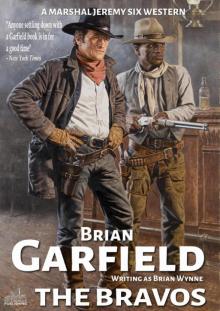 Marshal Jeremy Six #3
Marshal Jeremy Six #3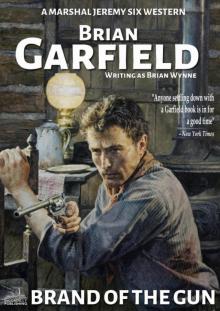 Marshal Jeremy Six #6
Marshal Jeremy Six #6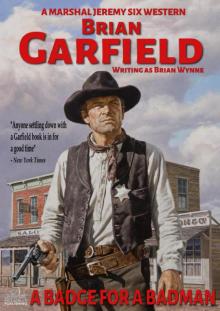 Marshal Jeremy Six #5
Marshal Jeremy Six #5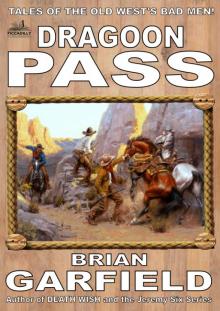 The Outlaws 2
The Outlaws 2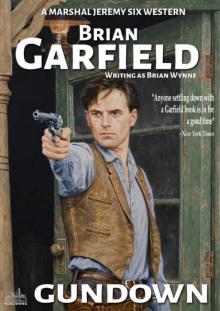 Marshal Jeremy Six #7
Marshal Jeremy Six #7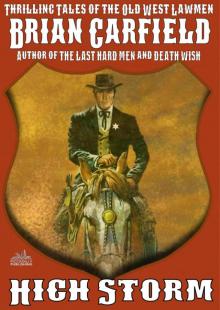 The Lawbringers 4
The Lawbringers 4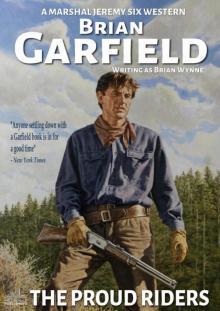 Marshal Jeremy Six #4 the Proud Riders
Marshal Jeremy Six #4 the Proud Riders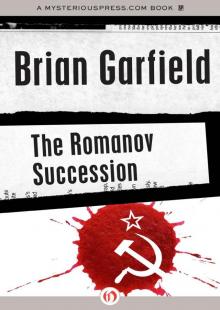 The Romanov succession
The Romanov succession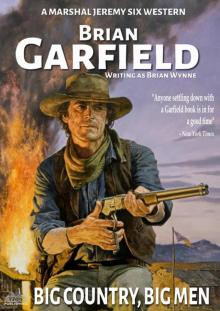 Marshal Jeremy Six #8
Marshal Jeremy Six #8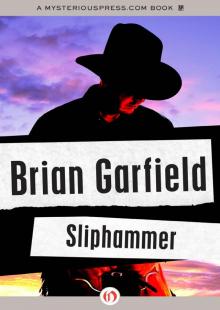 Sliphammer
Sliphammer Line of Succession
Line of Succession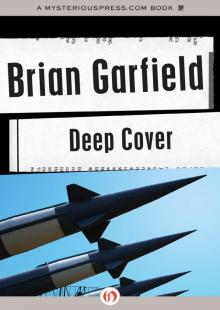 Deep Cover
Deep Cover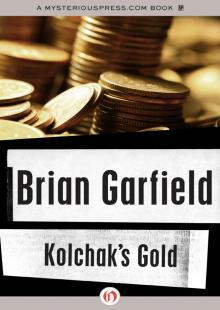 Kolchak's Gold
Kolchak's Gold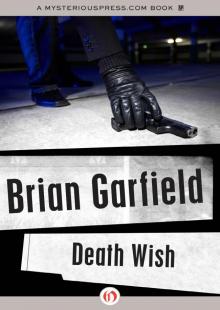 Death Wish
Death Wish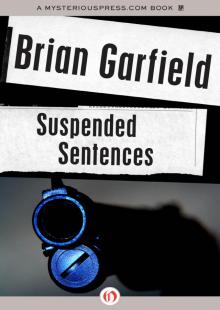 Suspended Sentences
Suspended Sentences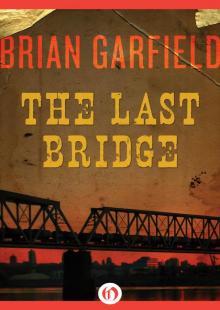 The Last Bridge
The Last Bridge Relentless
Relentless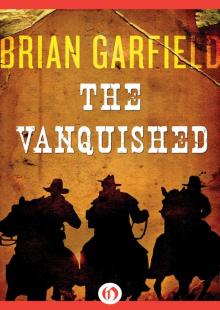 The Vanquished
The Vanquished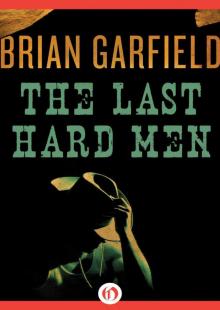 The Last Hard Men
The Last Hard Men Hit and The Marksman
Hit and The Marksman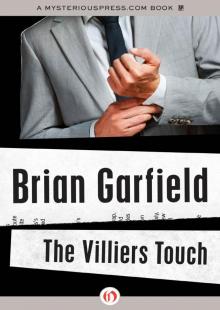 Villiers Touch
Villiers Touch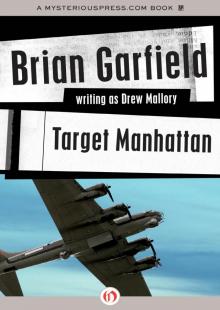 Target Manhattan
Target Manhattan Marchand Woman
Marchand Woman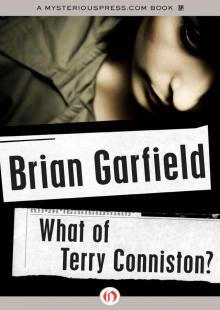 What of Terry Conniston?
What of Terry Conniston?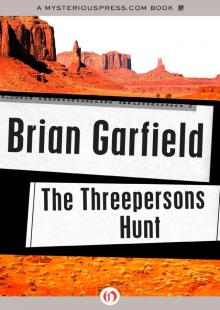 Threepersons Hunt
Threepersons Hunt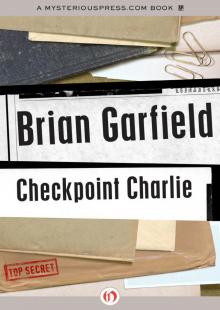 Checkpoint Charlie
Checkpoint Charlie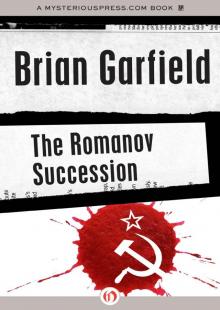 Romanov Succession
Romanov Succession Necessity
Necessity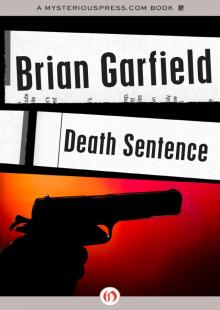 Death Sentence
Death Sentence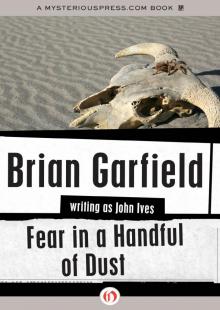 Fear in a Handful of Dust
Fear in a Handful of Dust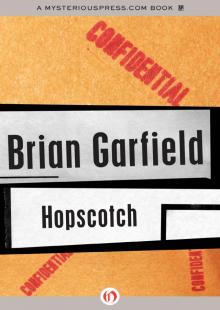 Hopscotch
Hopscotch